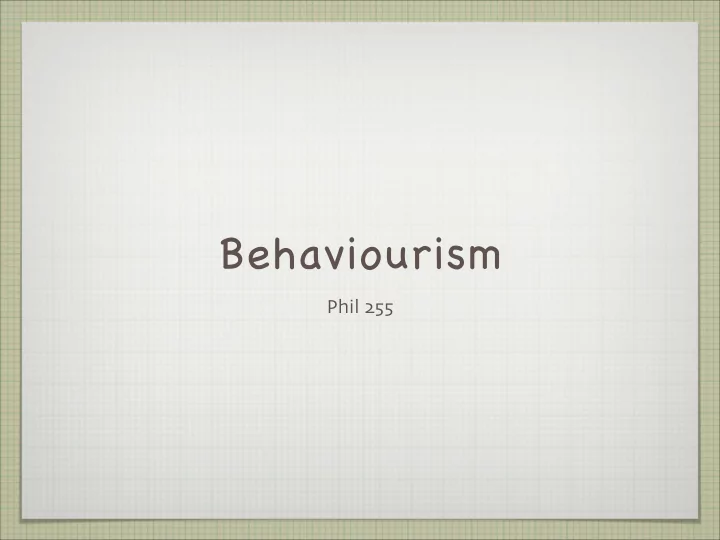

Behaviourism Phil 255
In Psychology: Watson When Watson published “ Psychology as the behaviourist views it ” in 1913, he established his reputation as the father of behaviourist psychology . He thought that human psychology should be studied in the same way as animal psychology . Watson ’ s most famous human experiments are those on “ Little Albert “. Let ’ s read an example ... here
Psychology as the behaviourist views it This paper is o � en called the behaviourist manifesto . It the fi rst example of a clear statement of a new vision for psychology , with two main features . Watson felt that there is “ no dividing line between man and brute .” How does he mean this?
Considerations for Behaviourism Scienti fi c method ( c . f . introspectionism ) : “ If you fail to reproduce my fi ndings , it is not due to some fault in your apparatus or in the control of your stimulus , but it is due to the fact that your introspection is untrained ” For behaviourists , ‘ internal ’ explanations are forbidden: e . g ., thought , attitudes , feelings , imagery , etc . Only physical properties need to to be discussed: e . g ,. wavelength , stimulus duration , or intensity Psychology could be done in terms of S&R , conditioning , habit integration , etc . Guarantees most important of all practical consequences
Versus Introspectionism Watson clearly disapproves of the introspectionist methodology . And he is upset by the fact that behavioural data is not , in and of itself , taken to be useful ( only a means to an end ). “ One can assume either the presence or absence of consciousness anywhere in the phylogenetic scale without a ff ecting the problems of behaviour by one jot or one tittle; and without in fl uencing in any way the mode of experimental attack upon them .” Like Darwin , need to remove man as the measure of all things Suggests consciousness is not a scienti fi cally useful concept His discussion of operant conditioning on page 35 demonstrates his alternative
Versus Functionalism Watson ’ s quarrel is with both with structuralist psychology and functionalist psychology Terms like sensation , perception , emotion , and so on are used as much by the functionalist . He argues that dividing things in terms of processes instead of in terms of content , doesn ’ t help . Why?
Against Philosophy Watson is no fan of philosophy , but that doesn ’ t stop him from doing it ... If we think mental states have functions it ’ s easy to think about the relation between mind and body & lapse into interactionism . Watson argues it doesn ’ t need to be that way: “ behaviourism is the only consistent and logical functionalism .” bye bye Philosophy! ( why? )
Limitations Watson but realizes there are di ffi cult cases . E . g ., What is Watson ’ s solution to such cases . Is it a plausible solution? ( Is it even reasonable? )
Summary Methodological Psychology is the scienti fi c study of ________ ( I: Psychology is the scienti fi c study of ________ ). Behavior is the externally measurable response to some externally measurable stimuli ( I: Yes , but a means to an end ). The proper method is ____________ ( I: ________________ ). The methods of ___________ are appropriate to ___________ ( I: ________________ ). The terminology: __________________ . ( I: _________________ ). If psychology is practical , ________________ ( I: ____________ ).
Summary (cont.) Theoretical Metaphysics: ______________ ( I: ___________________ ). People compared to animals: _______________ ( I: ___________ ). All psychologically relevant states are:________________ ( I: ________ ).
Philosophical Consequences Despite dismissing philosophy , some held strong philosophical views . Other behaviourists ( e . g ., Skinner ), took themselves to have interesting philosophical views about the nature of mind Thought is behaviour His view avoids the di ffi culties of introspectionism , but raises many others ( which we ’ ll revisit ).
And Philosophy Carnap ( famous for his logical positivism ) claimed that psychology should be “ degraded into a part of physics .” Carnap realized that this may not be practical but thought it should be in principle possible to do so . That is , higher sciences like psychology should have to bridge laws that connect them to physics . This underspeci fi ed claim was made more explicit in the work of Gilbert Ryle , who discusses how to analyze mentalistic terms into behavioural ( and hence physical ) ones .
Recommend
More recommend